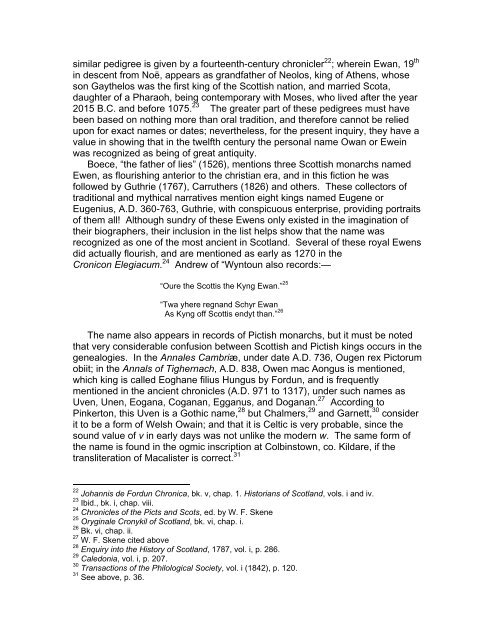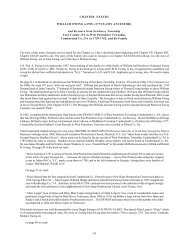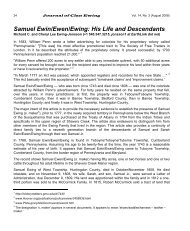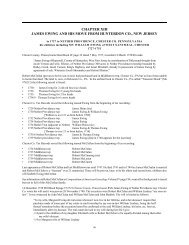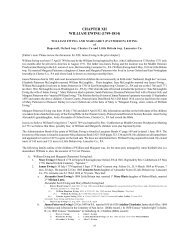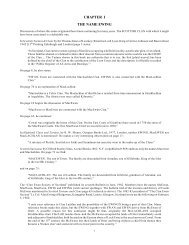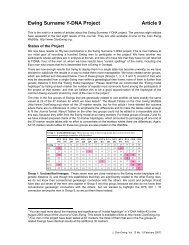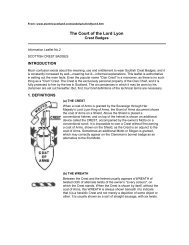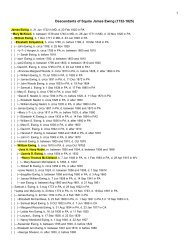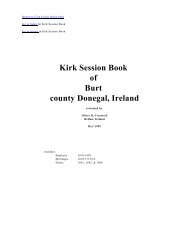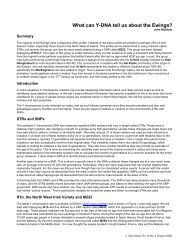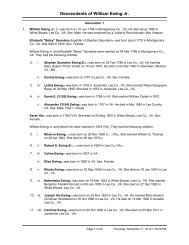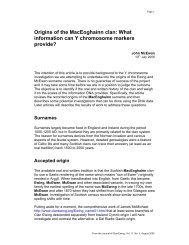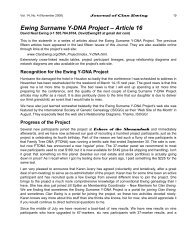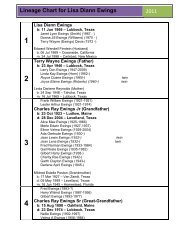Chapter XIV - Ewing Family Association
Chapter XIV - Ewing Family Association
Chapter XIV - Ewing Family Association
You also want an ePaper? Increase the reach of your titles
YUMPU automatically turns print PDFs into web optimized ePapers that Google loves.
similar pedigree is given by a fourteenth-century chronicler 22 ; wherein Ewan, 19 th<br />
in descent from Noë, appears as grandfather of Neolos, king of Athens, whose<br />
son Gaythelos was the first king of the Scottish nation, and married Scota,<br />
daughter of a Pharaoh, being contemporary with Moses, who lived after the year<br />
2015 B.C. and before 1075. 23 The greater part of these pedigrees must have<br />
been based on nothing more than oral tradition, and therefore cannot be relied<br />
upon for exact names or dates; nevertheless, for the present inquiry, they have a<br />
value in showing that in the twelfth century the personal name Owan or Ewein<br />
was recognized as being of great antiquity.<br />
Boece, “the father of lies” (1526), mentions three Scottish monarchs named<br />
Ewen, as flourishing anterior to the christian era, and in this fiction he was<br />
followed by Guthrie (1767), Carruthers (1826) and others. These collectors of<br />
traditional and mythical narratives mention eight kings named Eugene or<br />
Eugenius, A.D. 360-763, Guthrie, with conspicuous enterprise, providing portraits<br />
of them all! Although sundry of these Ewens only existed in the imagination of<br />
their biographers, their inclusion in the list helps show that the name was<br />
recognized as one of the most ancient in Scotland. Several of these royal Ewens<br />
did actually flourish, and are mentioned as early as 1270 in the<br />
Cronicon Elegiacum. 24 Andrew of “Wyntoun also records:—<br />
“Oure the Scottis the Kyng Ewan.” 25<br />
“Twa yhere regnand Schyr Ewan<br />
As Kyng off Scottis endyt than.” 26<br />
The name also appears in records of Pictish monarchs, but it must be noted<br />
that very considerable confusion between Scottish and Pictish kings occurs in the<br />
genealogies. In the Annales Cambriæ, under date A.D. 736, Ougen rex Pictorum<br />
obiit; in the Annals of Tighernach, A.D. 838, Owen mac Aongus is mentioned,<br />
which king is called Eoghane filius Hungus by Fordun, and is frequently<br />
mentioned in the ancient chronicles (A.D. 971 to 1317), under such names as<br />
Uven, Unen, Eogana, Coganan, Egganus, and Doganan. 27 According to<br />
Pinkerton, this Uven is a Gothic name, 28 but Chalmers, 29 and Garnett, 30 consider<br />
it to be a form of Welsh Owain; and that it is Celtic is very probable, since the<br />
sound value of v in early days was not unlike the modern w. The same form of<br />
the name is found in the ogmic inscription at Colbinstown, co. Kildare, if the<br />
transliteration of Macalister is correct. 31<br />
22 Johannis de Fordun Chronica, bk. v, chap. 1. Historians of Scotland, vols. i and iv.<br />
23 Ibid., bk. i, chap. viii.<br />
24 Chronicles of the Picts and Scots, ed. by W. F. Skene<br />
25 Oryginale Cronykil of Scotland, bk. vi, chap. i.<br />
26 Bk. vi, chap. ii.<br />
27 W. F. Skene cited above<br />
28 Enquiry into the History of Scotland, 1787, vol. i, p. 286.<br />
29 Caledonia, vol. i, p. 207.<br />
30 Transactions of the Philological Society, vol. i (1842), p. 120.<br />
31 See above, p. 36.


